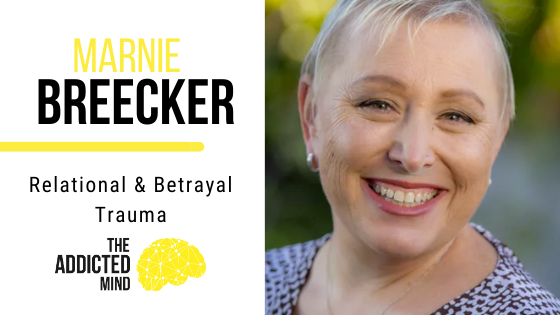Our guest today is Marnie Breecker from the Center for Relational Healing in Los Angeles. In this first episode of a two-part series on the topic of relational and betrayal trauma, we will be defining what this type of trauma looks like and its impacts on both partners in the relationship.
As a sex addiction therapist and a marriage and family therapist, Marnie is an expert identifying and assessing the traumatic impact of the discovery of infidelity or betrayal on relationships as a whole and the individuals involved. She shares with us that two types of trauma affected partners go through: the trauma of discovery and the trauma of their response to the betrayal.
It is very rare for addicts to come forward for help on their own, so it is likely that the partner has discovered the betrayal either intentionally or unintentionally through their partner’s computer history, text messages, or receipts and bank statements. Upon this initial discovery of betrayal, the partner can exhibit symptoms of depression, shock, anger, hypervigilance, isolating behavior, lifestyle changes such as beginning to smoke or drink, and a general questioning of everything they thought was true before this discovery. When the partner’s expectations are violated, they lose trust in their partner as well as themselves, and they begin seeking safety in a variety of ways because they feel that they cannot trust their senses.
After the initial trauma of discovery has run its course, partners often go through a time of trauma about their response to the betrayal, extending their questioning of everything they thought was true as well as noticing ways that their lifestyle may have changed during the process. Common reactions to betrayal include obsession, depression, anger, hypervigilance, and rumination on the betrayal and these reactions can cause the partners to lose faith in themselves and their abilities to make rational decisions.
Marnie identified the five dimensions of trauma as emotional, sexual, existential, life crisis, and relational, so the healing process must encompass each of these dimensions. When reconciliation begins between the two partners in the relationship, it is important for the recovering addict to put in the effort to support their partner and not exasperate the trauma that they have gone through. There is always an opportunity for rupture or repair, and even in the recovery process, there are triggers that could unearth aspects of the trauma that have or have not yet been dealt with.
Though this is a tough journey, it is important to remember that it will not always be this way, there are plenty of resources to help heal from relational betrayal, and there is hope.
To find out more about Marnie and the Center for Relational Healing, visit lacrh.org or call (323) 860-9999.


